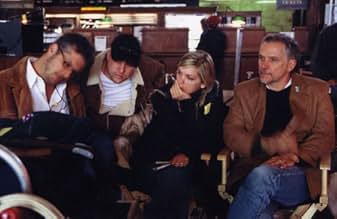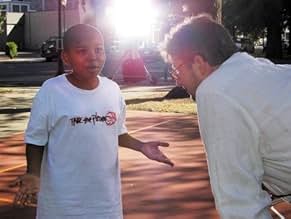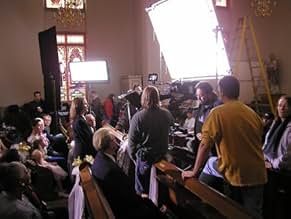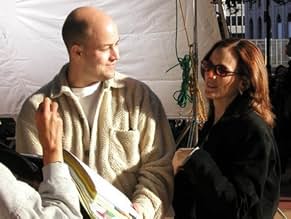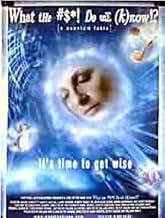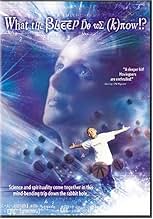A fictional photographer's quest to spiritually rediscover herself is interspersed with documentary footage of scientists and theologians discussing the philosophical aspects of quantum phys... Read allA fictional photographer's quest to spiritually rediscover herself is interspersed with documentary footage of scientists and theologians discussing the philosophical aspects of quantum physics.A fictional photographer's quest to spiritually rediscover herself is interspersed with documentary footage of scientists and theologians discussing the philosophical aspects of quantum physics.
- Awards
- 2 wins total
James Langston Drake
- Groom
- (as Jame Drake)
Michele Mariana
- Tour Guide
- (as Michelle Mariana)
Featured reviews
It's nice to see that there are some movies being made and released into mainstream theaters that actually make you think. Great fictional films do this through the delivery of their stories, but What the #$*! Do We Know does it in a much more direct way, almost like an educational film. It's a fascinating exploration of existential theories and philosophy, and is one of those very rare movies that will challenge the way you think even about everyday life. It's a strange film and moves entirely too fast for much of it's material to sink in, but it's a great exploration of quantum physics and some of the implications that it has on our lives that we really don't think about, but should.
The story sporadically focuses on the life of Amanda (Marlee Matlin), a deaf woman suffering through heartbreak and work troubles but who ultimately alters her perception by applying certain rules and theories of quantum physics, as I imagine we are expected to after seeing the movie. The great thing about the movie is that it makes you think, but the biggest problem with it is that it uses presentation to make simple statements seem grand and make crazy assertions seem like they have merit.
There is one point where the movie says, "Here's a puzzle - why should we be able to remember the past and not have the same access to the future?'' What is that? A completely obvious fact of linear time is rendered strange just by being in this movie. It's odd that the movie delves so deep into such statuesque disciplines as quantum physics and the very fabric of the universe, while not knowing why you can remember a conversation you had today, but for some weird, unknown and mysterious reason, you can't remember a conversation you will have tomorrow.
The film also makes outlandish claims and then shrouds them in the mysteriousness of unobservable history. There is a part of the movie that claims that when the first ships arrived in what is now North America, the Native Americans looked out to sea and saw the water parted by the ships, but could not see the ships themselves because they had never seen anything like them before. This, obviously, is utter nonsense, but the movie uses it as an example of its suggestion that there are different levels of reality for different people. There is no pure, objective reality, but different plains of existence for different people.
A friend of mine, who hails this as one of the greatest films he's ever seen, explained to me that the Native Americans' minds simply did not understand how to decode the concept of a ship, a signifier which they had never encountered and so it was perfectly understandable that they couldn't see it. Wrong! Sure, they had never seen ships before, but I am willing to go out on a limb and assume that they had seen wood before, and since vision is merely the process of light bouncing off of objects and coming into contact with the retina inside the eye, it is physically impossible for a Native American to have x-ray vision because he or she doesn't know what a certain object is.
My friend used the example that it is not until you learn that lightning travels from the ground to the clouds rather than the other way around that you really begin to see it that way. Before you learn that curious little fact, you see lightning and are completely sure that it's coming out of the clouds and zapping the earth. You do see it differently from then on, it's true, but you did SEE it before you knew where it originated, right? And incidentally, lightning is known to travel from the ground to the clouds, from the clouds to the ground, and from one cloud to another. But when it occurs, I am willing to suggest that it's rarely invisible, even if, as they say, there's no one there to see it.
I believe that the human mind is set up to believe what it wants to believe (hence religion), but I do not feel obliged to believe that people's beliefs or knowledge enable them to see through solid objects just because they've never seen them before, nor do I believe that any human has the ability to change the molecular structure of water just by thinking about it in a certain way, which is another of the more bizarre claims that the movie makes. I don't know, I just never thought of water as susceptible to being offended or made happy, or having any effect over human emotions.
But while the movie does slip up by going a little far in claims like these, it's important to have things like this because even for things like invisible ships, which we know are not reality, it is good that it makes you think about them. There are a lot of things in the world that we take for granted, and not just possessions but truths, and it is movies like What the #$*! Do We Know that really get people thinking about them. For a while, at least.
The story sporadically focuses on the life of Amanda (Marlee Matlin), a deaf woman suffering through heartbreak and work troubles but who ultimately alters her perception by applying certain rules and theories of quantum physics, as I imagine we are expected to after seeing the movie. The great thing about the movie is that it makes you think, but the biggest problem with it is that it uses presentation to make simple statements seem grand and make crazy assertions seem like they have merit.
There is one point where the movie says, "Here's a puzzle - why should we be able to remember the past and not have the same access to the future?'' What is that? A completely obvious fact of linear time is rendered strange just by being in this movie. It's odd that the movie delves so deep into such statuesque disciplines as quantum physics and the very fabric of the universe, while not knowing why you can remember a conversation you had today, but for some weird, unknown and mysterious reason, you can't remember a conversation you will have tomorrow.
The film also makes outlandish claims and then shrouds them in the mysteriousness of unobservable history. There is a part of the movie that claims that when the first ships arrived in what is now North America, the Native Americans looked out to sea and saw the water parted by the ships, but could not see the ships themselves because they had never seen anything like them before. This, obviously, is utter nonsense, but the movie uses it as an example of its suggestion that there are different levels of reality for different people. There is no pure, objective reality, but different plains of existence for different people.
A friend of mine, who hails this as one of the greatest films he's ever seen, explained to me that the Native Americans' minds simply did not understand how to decode the concept of a ship, a signifier which they had never encountered and so it was perfectly understandable that they couldn't see it. Wrong! Sure, they had never seen ships before, but I am willing to go out on a limb and assume that they had seen wood before, and since vision is merely the process of light bouncing off of objects and coming into contact with the retina inside the eye, it is physically impossible for a Native American to have x-ray vision because he or she doesn't know what a certain object is.
My friend used the example that it is not until you learn that lightning travels from the ground to the clouds rather than the other way around that you really begin to see it that way. Before you learn that curious little fact, you see lightning and are completely sure that it's coming out of the clouds and zapping the earth. You do see it differently from then on, it's true, but you did SEE it before you knew where it originated, right? And incidentally, lightning is known to travel from the ground to the clouds, from the clouds to the ground, and from one cloud to another. But when it occurs, I am willing to suggest that it's rarely invisible, even if, as they say, there's no one there to see it.
I believe that the human mind is set up to believe what it wants to believe (hence religion), but I do not feel obliged to believe that people's beliefs or knowledge enable them to see through solid objects just because they've never seen them before, nor do I believe that any human has the ability to change the molecular structure of water just by thinking about it in a certain way, which is another of the more bizarre claims that the movie makes. I don't know, I just never thought of water as susceptible to being offended or made happy, or having any effect over human emotions.
But while the movie does slip up by going a little far in claims like these, it's important to have things like this because even for things like invisible ships, which we know are not reality, it is good that it makes you think about them. There are a lot of things in the world that we take for granted, and not just possessions but truths, and it is movies like What the #$*! Do We Know that really get people thinking about them. For a while, at least.
I was not surprised to see many of the comments here about this film calling into question everything about it's premise. While reviewing this film for my newspaper (Cedar Rapids Gazette) I knew immediately that the concepts would be controversial and hard for the conditioned American mind to wrap itself around.
Having said that, it seems that many people view a movie like this as an all or nothing proposition -- if one theory or belief seems flawed, then it all must be called into question. What I think too many polemicists are forgetting is that this picture is a smorgasbord of different theories presented, as Rod Serling might say, for you approval -- or not.
But what many are missing is what makes this film revolutionary -- that filmmakers were able to present these concepts in the medium of film in a way that was at least entertaining and most, thought provoking. You don't have to buy off 100 percent on what is here, but the presentation, in and of itself, was stunning in its bombardment of the viewer with multi sensory imagery.
That this film was even made at all is a mini-miracle, especially in our current intellectual and cultural climate. Its sad to me to see such judgmental reviews. I knew conventional Christians would simply dismiss this as "new age" fluff and I mentioned that in my review. But I would have hoped that lovers of film and higher order thinking would be more tolerant of some of the excesses.
In short, this is a film that needs to be seen not just for its quasi-cinematic, quasi-documentary methodology but for a presentation of theories and beliefs that are rarely discussed in the ossified American mainstream. For that alone, I thank the filmmakers.
Having said that, it seems that many people view a movie like this as an all or nothing proposition -- if one theory or belief seems flawed, then it all must be called into question. What I think too many polemicists are forgetting is that this picture is a smorgasbord of different theories presented, as Rod Serling might say, for you approval -- or not.
But what many are missing is what makes this film revolutionary -- that filmmakers were able to present these concepts in the medium of film in a way that was at least entertaining and most, thought provoking. You don't have to buy off 100 percent on what is here, but the presentation, in and of itself, was stunning in its bombardment of the viewer with multi sensory imagery.
That this film was even made at all is a mini-miracle, especially in our current intellectual and cultural climate. Its sad to me to see such judgmental reviews. I knew conventional Christians would simply dismiss this as "new age" fluff and I mentioned that in my review. But I would have hoped that lovers of film and higher order thinking would be more tolerant of some of the excesses.
In short, this is a film that needs to be seen not just for its quasi-cinematic, quasi-documentary methodology but for a presentation of theories and beliefs that are rarely discussed in the ossified American mainstream. For that alone, I thank the filmmakers.
In the Victorian era, the "new science" was the extraordinary new theory of electromagnetism. Maxwell's equations were every bit as revolutionary as relativity or quantum mechanics would be later. The new age religion of the era was spiritualism, the belief in the afterlife and the ability to cross into it.
As surely as snow falls, religion will appropriate the prevailing cosmology for its own ends. A century ago that was science and so it is today. Then, the appropriation of Maxwell's insights on electromagnetism was an amazing confabulation of "animal magnetism" and vibrational resonance. We don't use the term "Mesmerism" any more, but in any new age bookshop, you'll still see references to vibrations. The notion of "auras" is from this era.
Every time science produces new tools, it gets swallowed by folks hungry for some "explanation" of what they would believe in any case. So when there was a new notion of relative time, you had a slew of religious notions woven around it. You can trace the main ones to Ouspensky and Gurdjieff. In that case, psychism and reincarnation found scientific explanations.
Quantum mechanics affords much greater flexibility for the next generation of appropriators, the era we are now in. That's because it has intrinsic mystical features even for the staid physicists who use it.
This movie has three parts. The first merges quantum physics with ordinary life. The second introduces a theory of consciousness that enfranchises individual cells (here shown in animation) with intent and agency. And the third part merges the two in a way that suggests you can control at least your own body and perhaps the physics of the space around you. Its all linked to QM.
The problem is that these folks start with the convincing notion that we live in a world of inadequate models. That's a good insight. Then they introduce QM as if it really was the way the world works. It isn't, folks. Its just another model, and a very, very problematic one at that. In physics, it doesn't even work in the most common force in physics, gravity.
It has absolutely no utility or meaning in the fields of chemistry, biology, and all the social and cognitive sciences that are the lions share of where we actually live. And even where it applies, it applies at scales that are so tiny the notion of "observer" becomes laden with artificial baggage.
There are very serous scientists who are dedicated to eliminating it as a theoretical tool because it reduces the world to numbers, the most ridiculously blunt abstraction. Just because you find a physicist with a PhD, doesn't mean you've found someone who understands the limits of the method.
The real sadness about this is that there really is a mystical vision to be had here. Its one that works with the notion of notation always being ephemeral. These smoothtalking purveyors of happiness are our worst enemy because they simply substitute one mythology for another. You owe it to yourself to study the issues here well enough to discard them.
Otherwise, you might as well just give up and do what the man wants.
I usually like watching movies made by religious zealots. They are often about fighting the devil, and the makers really believe the movie itself fights the devil. Its a cool fold. But this is just dangerous nonsense.
Ted's Evaluation -- 1 of 3: You can find something better to do with this part of your life.
As surely as snow falls, religion will appropriate the prevailing cosmology for its own ends. A century ago that was science and so it is today. Then, the appropriation of Maxwell's insights on electromagnetism was an amazing confabulation of "animal magnetism" and vibrational resonance. We don't use the term "Mesmerism" any more, but in any new age bookshop, you'll still see references to vibrations. The notion of "auras" is from this era.
Every time science produces new tools, it gets swallowed by folks hungry for some "explanation" of what they would believe in any case. So when there was a new notion of relative time, you had a slew of religious notions woven around it. You can trace the main ones to Ouspensky and Gurdjieff. In that case, psychism and reincarnation found scientific explanations.
Quantum mechanics affords much greater flexibility for the next generation of appropriators, the era we are now in. That's because it has intrinsic mystical features even for the staid physicists who use it.
This movie has three parts. The first merges quantum physics with ordinary life. The second introduces a theory of consciousness that enfranchises individual cells (here shown in animation) with intent and agency. And the third part merges the two in a way that suggests you can control at least your own body and perhaps the physics of the space around you. Its all linked to QM.
The problem is that these folks start with the convincing notion that we live in a world of inadequate models. That's a good insight. Then they introduce QM as if it really was the way the world works. It isn't, folks. Its just another model, and a very, very problematic one at that. In physics, it doesn't even work in the most common force in physics, gravity.
It has absolutely no utility or meaning in the fields of chemistry, biology, and all the social and cognitive sciences that are the lions share of where we actually live. And even where it applies, it applies at scales that are so tiny the notion of "observer" becomes laden with artificial baggage.
There are very serous scientists who are dedicated to eliminating it as a theoretical tool because it reduces the world to numbers, the most ridiculously blunt abstraction. Just because you find a physicist with a PhD, doesn't mean you've found someone who understands the limits of the method.
The real sadness about this is that there really is a mystical vision to be had here. Its one that works with the notion of notation always being ephemeral. These smoothtalking purveyors of happiness are our worst enemy because they simply substitute one mythology for another. You owe it to yourself to study the issues here well enough to discard them.
Otherwise, you might as well just give up and do what the man wants.
I usually like watching movies made by religious zealots. They are often about fighting the devil, and the makers really believe the movie itself fights the devil. Its a cool fold. But this is just dangerous nonsense.
Ted's Evaluation -- 1 of 3: You can find something better to do with this part of your life.
Okay, cult ties or not, this was an interesting film. It offers up a variety of ideas and leaves it to the viewer to decide whether or not to believe. Visually, it was a beautiful film with great art direction and special effects. Marlee Matlin was effective in the main role, although I thought the "story" detracted from the documentary portion of the film.
As to the film's ties to cults--I didn't see anything coercive or subversive in the film. After viewing it, I'm not ready to sell my soul to some guru. OTOH, I do find myself thinking more about the thoughts I have, and the effect they have on my spirit and body. Moral of the story--take out what you will, and don't join a cult. Duh.
As to the film's ties to cults--I didn't see anything coercive or subversive in the film. After viewing it, I'm not ready to sell my soul to some guru. OTOH, I do find myself thinking more about the thoughts I have, and the effect they have on my spirit and body. Moral of the story--take out what you will, and don't join a cult. Duh.
I wanted to like this film and was prepared for a treat. The visuals and the unusual way of presenting the material was initially stimulating and creative. What made it even easier for me to get involved was that the social ideology advanced closely matches my own. But the expressed connection between particle physics and social prescription was, in my view, either wishful thinking or intellectually dishonest. You can't use the harsh rigors of science to establish credibility and then let your logic go all warm and fuzzy coming to the conclusion you wanted all along -- especially if the conclusion is quite defensible on other bases. As a scientist, I was irritated. As a social liberal, I was embarrassed.
Did you know
- TriviaJohn Gorenfeld wrote in a September 2004 Salon article that David Albert, one of the interviewed experts in the film, feels he was duped and misrepresented as to the real purpose and agenda of the movie. "Albert, a professor at the Columbia University physics department, has accused the filmmakers of warping his ideas to fit a spiritual agenda. 'I don't think it's quite right to say I was "tricked" into appearing,' he said in a statement reposted by a critic on What the Bleep's Internet forum, 'but it is certainly the case that I was edited in such a way as to completely suppress my actual views about the matters the movie discusses. I am, indeed, profoundly unsympathetic to attempts at linking quantum mechanics with consciousness. Moreover, I explained all that, at great length, on camera, to the producers of the film ... Had I known that I would have been so radically misrepresented in the movie, I would certainly not have agreed to be filmed. I certainly do not subscribe to the 'Ramtha School on Enlightenment," whatever that is!' he finished. Albert provided Salon with an excerpt from a piece he's writing on the subject, in which he says, in part, 'I'm unwittingly made to sound as if (maybe) I endorse its thesis.' When told of Albert's complaints, [Meyer Gottlieb, president of the movie's distributor, Samuel Goldwyn Films] said, 'I certainly don't see it,' but acknowledged he's 'not into the science 100 percent.'"
- GoofsDepiction of quantum mechanics in the movie bears no resemblance to the real theory of that name. In particular, the common misconception that the "observer effect" is dependent upon a sapient, human observer is incorrect. If any object interacts with any other, and either requires information regarding the current state and properties of the other, then that constitutes an observation.
- Crazy creditsThe Scientists, Mystics and Scholars interviews herein were chosen based on the expertise in the subjects which they discussed. They do not necessarily agree with all viewpoints put forth in the film. Likewise the Filmmakers may not agree with all the viewpoints put forth by the Interviewees. Agreement is not necessary - thinking for one's self is.
- ConnectionsFeatured in Brows Held High: Mr. Nobody and Living in Bad Faith (2015)
- How long is What the #$*! Do We (K)now!??Powered by Alexa
Details
- Release date
- Country of origin
- Languages
- Also known as
- What the Bleep Do We Know!?
- Filming locations
- Production companies
- See more company credits at IMDbPro
Box office
- Gross US & Canada
- $10,942,306
- Opening weekend US & Canada
- $7,655
- Feb 8, 2004
- Gross worldwide
- $21,054,050
- Runtime
- 1h 49m(109 min)
- Color
- Sound mix
- Aspect ratio
- 1.85 : 1
Contribute to this page
Suggest an edit or add missing content







